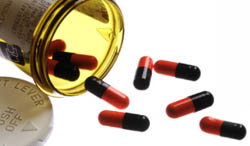 At Home: What a Pill
At Home: What a Pill
You’re sick, so your doctor hands you a sheaf of prescriptions. You get them filled and, not surprisingly, you start feeling better. Must be the magic of the meds, right? Perhaps not.
As The Globe and Mail reports, a recent survey suggests that 20 per cent of Canadian physicians ?occasionally [prescribe] their patients placebos, or [use] medications well below the active dose.?
While the so-called placebo effect?where improvement is seen because patients ?believe they have been given a real therapy??is a documented phenomenon, It’s usually only used in clinical drug trials and similar experiments. In fact, however, ?dummy pills . . . can influence patients? perceptions and sometimes their physical condition.?
But even if all’s well that ends well, the lack of transparency is a contested issue. For example, switching real drugs for placebos without the consent of patients is naturally ?highly controversial,? but not all physicians agree. Dr. Amir Raz, who’s also a professor of psychiatry at McGill University, believes that placebos ?could be used ethically, provided the right guidelines are in place??like those currently used in Germany.
After all, as Dr. Raz told reporters, with experience physicians can recognize when ?just the act of providing attention . . . and simply listening to the patient can actually have a profound effect on some clinical symptoms.?
However, currently the ?Canadian Medical Association . . . has no . . . formal policy? on placebo use.
Around the World: Gold Sticker
Remember those gold stickers you could earn for doing your homework and getting good grades? Perhaps you could cash them in for a prize?or earn extra privileges. But for one high school in north Texas, the stakes were especially high.
As MSNBC reports, a high school near Fort Worth, Texas, instituted a program that ?[motivated] students to stay in school? by sponsoring ?an annual car giveaway.? The car’s winner was chosen by random drawing, but students could earn tickets and increase their chances of winning by stepping up their ?academic performance? and making sure they attended classes.
The motivational program was created due to increasing concern over high school students? inclination to skip class and lower their academic standards. As the school principal told reporters, ?This is a motivational tool for them to work on their grades.?
One student won a 2011 Chevy Camaro, and 24 runners-up were each awarded a touch screen tablet.


